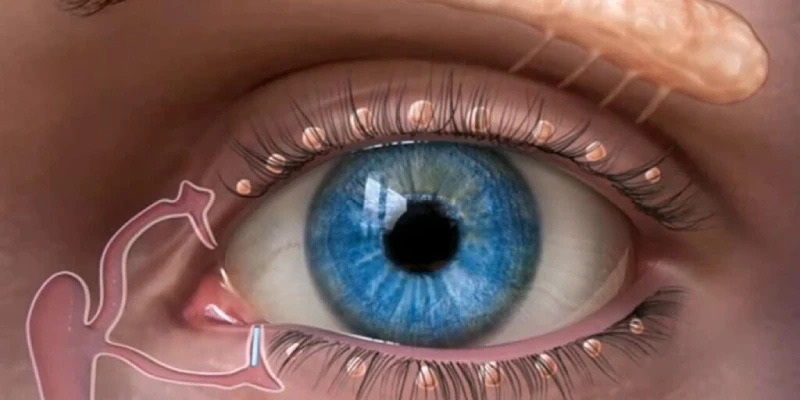Med info
Eye Flashes (Photopsia): Causes, Symptoms, and Effective Treatment Options

Table of content
ToggleEye flashes, also known as photopsia or flashes in front of the eye, are visual sensations that many people may experience at some point in their lives. They appear as brief flickers of light or lightning-like sparkles, and may sometimes be accompanied by what is known as floaters—tiny spots or strings that move within the visual field.
While in many cases these flashes are normal and harmless, in other cases they may indicate retinal disorders that require urgent medical evaluation to protect vision.
What Are Eye Flashes (Photopsia)?
Eye flashes occur when the optic nerve in the retina is stimulated due to tension or pressure inside the eye.
The vitreous body, a gel-like substance that fills the inside of the eye, can sometimes shift or pull on the retina. When this occurs, nerve cells are activated, causing the brain to interpret the signal as a flash of light.

Patients commonly describe flashes as:
A quick, bright spark
A sudden flicker of light
Flashing lights when moving the eyes
Light appearing in the dark or even with eyes closed
In many cases, this phenomenon occurs naturally as part of aging and changes within the eye. However, if the flashes are sudden, frequent, or worsening, medical evaluation is necessary.
Symptoms of Eye Flashes (Photopsia)
Flashes may be accompanied by additional visual symptoms, including:
Dark spots or dots that move with eye movement
Transparent threads resembling cobwebs
Increased visibility of floaters against bright backgrounds
Repeated flashing lights, especially when moving the eyes
A sensation that something is floating in the field of vision
Over time, the brain may adapt, making them less noticeable
Persistent, new, or worsening flashes should not be ignored.
When Should You See an Eye Doctor?
You should contact an ophthalmologist immediately if you notice:
Sudden onset of new flashes
A noticeable increase in floaters
A dark shadow or curtain appearing from the side of the vision
Blurry or distorted central or peripheral vision
Unusual or severe eye pain
These signs may indicate a retinal tear or retinal detachment, both of which require urgent medical treatment to prevent permanent vision loss.
A retinal exam may be recommended to assess the condition of the back of the eye.
Causes of Eye Flashes (Photopsia)
Several conditions can lead to flashes, including:
Age-related changes in the vitreous gel
As we age, the vitreous becomes more liquid and may move more freely, occasionally pulling on the retina and causing flashes.
Inflammation in the back of the eye
Inflammation of the retina or posterior uvea can release tiny particles into the vitreous, leading to floaters and flashes.

Vitreous Hemorrhage
Bleeding into the vitreous cavity may occur due to:
Diabetic retinopathy
High blood pressure
Eye trauma
Blood cells are seen as floating spots in the vision.
Retinal Tear or Retinal Detachment
In some cases, the vitreous pulls strongly enough to tear the retina, allowing fluid to pass behind it and cause detachment.
This is one of the most serious causes and can lead to permanent loss of vision if not treated quickly.
Effects of Certain Eye Medications or Surgeries
Some eye injections or vitreous procedures may introduce temporary bubbles or particles that appear as floaters.
Who Is at Higher Risk of Eye Flashes?
Individuals over the age of 50
People with high myopia (nearsightedness)
Those with a history of eye trauma
Patients who have undergone cataract surgery
People with diabetic retinal disease
Individuals with recurrent eye inflammation

Treatment for Eye Flashes (Photopsia)
Treatment depends on the underlying cause:
1) Vitrectomy Surgery
The vitreous gel is surgically removed and replaced with a special solution.
This is usually recommended only when symptoms significantly affect vision or daily life due to risks such as:
Infection
Bleeding
Retinal detachment
2) Laser Treatment
A specialized laser may be used to break up floaters and make them less noticeable.
This procedure is reserved for select cases depending on retinal evaluation.

3) Observation and Routine Monitoring
In many situations, the brain adapts to the floaters and flashes over time, leading to reduced awareness of the symptoms.
Accurate diagnosis through retinal examination is essential before determining treatment.
When Do Eye Flashes Require Emergency Care?
Seek urgent medical attention if you experience:
Sudden loss of vision
A shadow or curtain descending across your field of view
Rapid increase in floaters or flashes
Sudden pain or redness in the eye
These may signal a retinal detachment, which is an emergency.
Diagnosis and Treatment of Eye Flashes at Batal Eye Specialist Center in Jeddah
At Batal Eye Specialist Center, we use state-of-the-art medical technologies to diagnose and treat retinal conditions, including:
High-resolution fundus (retinal) imaging
OCT imaging to examine retinal layers in detail
Laser therapy for retinal tears or weak points
Advanced retinal surgery for emergency cases
A team of experienced retinal specialists evaluates each case individually to determine the most effective treatment plan and ensure visual safety.
Book a Consultation or Visit Us
If you are experiencing eye flashes or sudden floaters, do not wait for symptoms to worsen.
Our medical team is ready to provide accurate diagnosis and personalized treatment designed to protect your vision.



